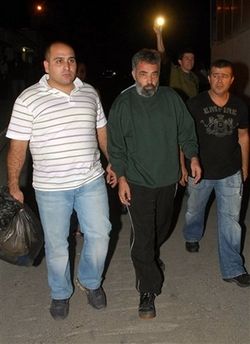 By ZEINA KARAM, Associated Press Writer Mon Oct 15, 6:14 PM ET NAQOURA, Lebanon – Israel exchanged a Hezbollah prisoner and the bodies of two Lebanese fighters for the corpse of a drowned Israeli civilian Monday night, a move that could pave the way for a trade involving two Israeli soldiers whose capture sparked their war last year.
By ZEINA KARAM, Associated Press Writer Mon Oct 15, 6:14 PM ET NAQOURA, Lebanon – Israel exchanged a Hezbollah prisoner and the bodies of two Lebanese fighters for the corpse of a drowned Israeli civilian Monday night, a move that could pave the way for a trade involving two Israeli soldiers whose capture sparked their war last year.
A crowd of people, some weeping, mobbed two ambulances carrying the Lebanese bodies after a swap with the Israeli military just after sundown in the no man’s land along the heavily fortified border. Two women in black showered the ambulances with rice while relatives of the two martyrs held up their pictures. The freed Hezbollah member came across the border in a black Mercedes, peering out of the window and smiling. The exchange was the fourth between Hezbollah and Israel in recent years and it could improve chances for more deals, including that of the two Israeli soldiers.
In a statement, Israeli Prime Minister Ehud Olmert‘s office said the swap was "in the framework of negotiations to return the captured soldiers, Eldad Regev and Ehud Goldwasser."
Hezbollah insisted in the past that the soldiers would be let go only in exchange for the freedom of all Lebanese held by Israel. But Monday’s swap could be a sign the Shiite Muslim militant group is willing to negotiate at a time when it is trying to soften its image ahead of Lebanon’s presidential election.
The statement from Olmert’s office said that in addition to the body of an Israeli who drowned in Lebanon nearly three years ago, "Hezbollah gave Israel additional information about another affair, and it will be checked soon."
It did not elaborate, but Ron Arad, an Israeli air force navigator has been missing since his plane was shot down over Lebanon in 1986.
In a statement late Monday, Hezbollah said it had given a U.N. mediator some "information relating to humanitarian issues that are of common interest" to itself and Israel.
"Hezbollah hopes that this goodwill gesture will help bring about progress to end all issues pertaining to the prisoners and the detainees," the group said.
Israel handed over the bodies of two militants killed in its war with Hezbollah a year ago and a captive Hezbollah guerrilla, who was released for medical reasons, Olmert’s statement said.
People in the crowd at the border crossing said Hezbollah identified the two returned dead men as Ali Wizwaz and Mohammed Dimashqiyeh. Lebanon’s state-run news agency identified the freed Hezbollah guerrilla as Hassan Naim Akil, who was captured during the war.
Israeli TV stations said the body of the Israeli citizen handed over was a Jewish immigrant from Ethiopia, Gabriel Dwait, who drowned in 2005.
"We believe that this is an example of what a future deal with the Hezbollah would look like that will bring about the release of all the Israelis held in Lebanon," Israeli Foreign Ministry spokesman Mark Regev said. "I would like to thank the U.N. and the International Red Cross, who helped make this happen."
Haim Malka, deputy director of the Middle East program at the Center for Strategic and International Studies in Washington, said the exchange would "likely set the stage for a more extensive swap," including the two captive soldiers.
"There is significant pressure on both the Israeli government and Hezbollah to resolve this issue. Since the end of the war last year, efforts have been made to broker a swap. … This signals that progress is being made," he said.
The U.N. Security Council resolution that halted the war demanded that Hezbollah turn over the seized Israeli soldiers. Their capture in July 2006 sparked a 34-day war between Hezbollah and Israel that killed up to 1,200 people in Lebanon. Israel had about 160 dead, most of them soldiers.
Hezbollah has not released any details on the conditions of the two soldiers.
David Schenker, senior Arab politics fellow at the Washington Institute for Near East Policy, said the swap was another confidence-building measure for Hezbollah.
"If a state is actively dealing with Hezbollah, which so many people call a state-within-a-state, it certainly confirms their stature in Lebanon," he said.
Bilal Saab, a Middle East security researcher at the Brookings Institution, said the presidential election in Lebanon might be behind Hezbollah’s gesture.
"Hezbollah will undoubtedly consider it (the exchange) another victory under its belt and will seek to sell it internally by pushing harder for a presidential compromise candidate," Saab said.
Lebanon’s parliament failed to elect a president last month because of a boycott by the Hezbollah-led opposition, and the vote was rescheduled for Oct. 23.
Some 100 people gathered for the exchange at the border crossing into Naqoura, a town on Lebanon’s coast.
Among those waiting was Hussein Wizwaz, in his 60s, the father of one of the two dead guerrillas handed over by Israel.
"I heard on television that there will be some prisoner exchange," the father said, adding that he contacted a Hezbollah office and was told the bodies of his son and Dimashqiyeh were being returned.
Dimashqiyeh’s aunt, Maryam Saad, waved her nephew’s portrait over her head and wept. "Whether him or others, I will not be upset," she said. "All our prisoners and martyrs are equal and the same."
___
Associated Press writers Sam Ghattas in Beirut, Mark Lavie in Jerusalem and Lily Hindy in New York contributed to this report



